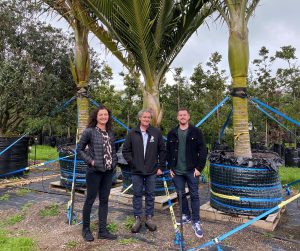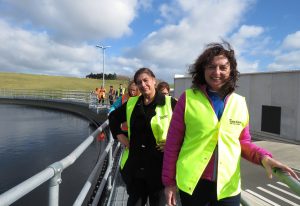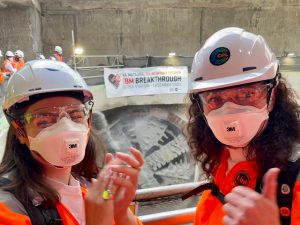This is my first Councillor report of 2022. It has been prepared for the February business meetings of the Waitematā, Waiheke and Aotea Great Barrier Local Boards.
This month I look ahead to what is coming up this year relevant to my various positions*. There is still a great deal of uncertainty about how the year will shape up but the on-going response to the pandemic will continue be a central focus.
There is also no escaping that this year is election year! In September I will be standing again for the position of Councillor for the Waitematā and Gulf ward.
Climate Action (Deputy Chair, Environment and Climate Change Committee)
In all my decision making across all my Governing Body work I ask the question whether the recommended approach puts us on a pathway for meeting our ambitious emission reduction targets. The Transport Emissions Reduction Plan progress report received by the committee in December 2021 confirmed Auckland’s emissions are not remotely tracking in line with the target to reduce emissions by 50 percent by 2030.
A big challenge that tests the wider council family is how to move away from business-as-usual thinking. For example, the Eastern Busway project builds in not just PT but a significant widening of general traffic lanes based on “modelling” for growth. I have asked the project team to explain what has been modelled based on the inputs required to meet emissions targets by reducing vehicle trips. A decision on the project goes to the AT Board on 24 February.
Another significant opportunity to deliver on Auckland’s Climate Plan Te Tāruke a Tāwhiri comes with the refresh of the Cycling Business Case due with the Planning Committee in March. It will require a massive step up in budget, delivery, and ambition to provide the safe infrastructure needed to provide a genuine alternative to driving, especially for local trips. How Auckland Transport undertakes renewals is another area where I have been pushing for a change in approach from “like for like” renewals that fail to leverage opportunities for safer, climate friendly streets and a reduction in costs.
Some of the key pieces of work coming to the Environment and Climate Change committee this year include:
- Climate change adaptation targets
- Corporate sustainability strategy
- Draft National Adaptation Plan released for consultation in August (TBC)
- Final Emissions Reduction Plan to be released in May

As Deputy Chair of the Committee, I have worked with Chair Hills in support of the Mayor’s proposed Climate Action Targeted Rate (CATR) over 10 years that will fund $574 million directly and seek to unlock a further $471 million from Government subsidies and other sources to help us meet our climate commitments.
It will see more than $600 million invested in 10 new frequent bus routes and 69 improved bus routes, as well as 79 additional electric or hydrogen buses. This will deliver improved services available to more than a million Aucklanders and see 170,000 more people brought within 500m of a frequent bus route. $122 million will go towards replacing aging diesel ferries, which contribute 21 per cent of public transport emissions, with low emission ferries.
- Cycling and walking will benefit from a $228 million investment in new infrastructure and improvements or extensions to existing routes, making our streets safer for our kids to walk or cycle to school.
- Around 15,000 native trees between 1-1.5 meters tall will be planted on streets and in parks, playgrounds and road reserves, while thousands of additional trees and plants will go to extending bush remnants. Our planting programme will focus on low-income areas that currently have a low tree cover.
- The CATR proposal is going out for consultation as part of the Annual Budget 22/23 from 28 February until 28 March https://akhaveyoursay.aucklandcouncil.govt.nz/. I will be taking part in a range of programmed consultation events including in person on Aotea Great Barrier on 12 March (subject to traffic light settings).
Also in the consultation is a proposal to move to a region-wide rates-funded rubbish collection service with a choice of three bin sizes (with different pricing for each) to accommodate different household needs. Standardised services and charges across the region will mean everyone pays the same for the same size bin no matter where you live, which is more equitable. The proposed rates-based service is also more cost effective than the currently planned pay-as-you-throw (PAYT) model with prepaid bin tags or bags.

In December I was a signatory to council’s feedback on the Ministry for the Environment’s proposals for a new waste strategy and the issues and options for new waste legislation (Te kawe i te haepapa para – Taking responsibility for our waste). Council’s submission noted the need for greater ambition from government to make Aotearoa a world leader in a circular economy approach. The submission will be available on the Committee’s agenda in March.
Berm planting guidelines

A long-standing initiative I have been working on is the development of berm planting guidelines that recognise the community and environmental benefits of appropriate planting on Auckland’s grass verges or berms (also called nature strips).
Auckland Transport has resisted various attempts to develop guidelines and move beyond a prohibitive and prescriptive approach. I hope to see that change this year with a request to bring the issue to the Committee.
Restoring the health of Hauraki Gulf, Tīkapa Moana, Te Moananui-ā-Toi ( Co-chair, Hauraki Gulf Forum)
 In the first NZ Listener editorial of the year we (co-chairs) had the opportunity to highlight the positive impact of iwi-led rāhui and fishery closures are having in helping to heal the Hauraki Gulf, Tīkapa Moana, Te Moananui-ā-Toi.
In the first NZ Listener editorial of the year we (co-chairs) had the opportunity to highlight the positive impact of iwi-led rāhui and fishery closures are having in helping to heal the Hauraki Gulf, Tīkapa Moana, Te Moananui-ā-Toi.
This marked a positive start to what will be a big year for the Forum as we progress our goals to protect and enhance the Gulf. At our 28 February meeting we will be considering options to upgrade and strengthen the Hauraki Gulf Marine Park Act. There are likely to be amendments to the Act as a result of the Resource Management and Conservation reforms and as a result of proposals from Revitalising the Gulf. However, there is no process at the moment for a full review of the HGMPA. The Forum is just updating our advocacy position on legislative changes we think are necessary and looking at models of co-governance such as the Waikato River model. The steps towards forming an advocacy position on how the Act could be strengthened in the best interests of the Hauraki Gulf has been underway for some time and through three separate reviews.
Consultation on the draft Regional Parks Management Plan
The Forum is looking to support the proposal in the draft Regional Parks Management Plan currently out for consultation to investigate including regional parks that contribute to the coastal areas of the Gulf into the Marine Park.
This has created some controversy because it has been incorrectly reported the proposal will in some way give control to the Forum over regional parks. In fact, if it did go ahead, it would mean that Council as owner and administrator of regional parks would have to recognise and give effect to the purpose of the Park.

The purposes of the Hauraki Gulf Marine Park are—
(a) to recognise and protect in perpetuity the international and national significance of the land and the natural and historic resources within the Park:
(b) to protect in perpetuity and for the benefit, use, and enjoyment of the people and communities of the Gulf and New Zealand, the natural and historic resources of the Park including scenery, ecological systems, or natural features that are so beautiful, unique, or scientifically important to be of national significance, for their intrinsic worth:
(c) to recognise and have particular regard to the historic, traditional, cultural, and spiritual relationship of tangata whenua with the Hauraki Gulf, its islands and coastal areas, and the natural and historic resources of the Park:
(d) to sustain the life-supporting capacity of the soil, air, water, and ecosystems of the Gulf in the Park.
Feedback on the draft plan is open until 4 March https://akhaveyoursay.aucklandcouncil.govt.nz/regional-parks-management-plan
Whale tales
 The move to red traffic light setting on 23 January has had a huge impact on the summer of events lined up for Auckland. Cancellations include Fashion Week, Pride Festival, Movies in Parks, Buskers Festival, Waitangi Day festivities and most of the Auckland Arts Festival programme.
The move to red traffic light setting on 23 January has had a huge impact on the summer of events lined up for Auckland. Cancellations include Fashion Week, Pride Festival, Movies in Parks, Buskers Festival, Waitangi Day festivities and most of the Auckland Arts Festival programme.
One event continuing until April is Whale Tales, a public art trail across Tāmaki Makaurau to raise awareness of the vital work WWF-New Zealand does to look after our ocean, including our beautiful Hauraki Gulf and its endangered resident, the Bryde’s Whale. In the pic a Whale Tale at Western Park, Ponsonby Road
Local Government Reforms (LGNZ National Council member and Auckland Zone co-chair)
A big part of council’s work this year will be responding to the Government’s reform agenda that is continuing at pace.
Three Waters

The council consulted with Aucklanders from 3-19 December 2021 on the Three Waters proposals to ensure the region’s views on the proposed new entity were represented when the working group on representation, governance and accountability reports back to the Minister of Local Government. An independent poll of more than 2000 people was also carried out for council by Kantar Public to ensure the views of a representative cross section of Aucklanders were heard.
The results show Auckland Council’s views on the government’s proposed three waters reforms are strongly backed by the public.
LGNZ sought a delay to the legislation last year until after the Working Group reports back at the end of February. It is not about “stopping three waters” when there is a compelling case for change but ensuring the new model is fit for purpose and accountable.
Housing
The Resource Management (Enabling Housing Supply and Other Matters) Amendment Act was passed into law in December. The new Act brings into effect Medium Density Residential Standards (MDRS) relaxing key design standards in Auckland’s current Mixed Housing Urban Zone. The Act removes council’s ability to include standards more restrictive than the MDRS giving rise to concerns regarding the potential for poor quality outcomes. The MDRS applies across all residential zones except Aotea and Waiheke (this was a positive change made to the Bill) and predominantly rural areas with populations less than 5,000.
The Unitary Plan change incorporating the MDRS requirements must be notified by Council by August this year. I am working to ensure that a more focused pre-notification engagement around key topics (such as council’s proposals in relation to Special character areas) takes place despite the more challenging timeframe brought in by the Act. The Planning Committee are due to be advised of the revised timetable shortly.
 (Photo taken by my mum from her balcony at Co-Haus Grey Lynn. This type of housing will be enabled under the new Act. Full disclosure: I live around the corner in a special character zone. I think we can work towards a win-win of more housing AND heritage protection of what all Aucklanders value).
(Photo taken by my mum from her balcony at Co-Haus Grey Lynn. This type of housing will be enabled under the new Act. Full disclosure: I live around the corner in a special character zone. I think we can work towards a win-win of more housing AND heritage protection of what all Aucklanders value).
Resource Management Reform
One of the key issues that I have pushed, along with Cr Hills and the Mayor, through the reform process currently underway has been the need to reinstate tree protection at the earliest opportunity.
The beating heart of Tāmaki Makaurau (member of the Auckland City Centre Advisory Board and member of the Auckland Domain Committee)

In December it was announced that the last three stages of the Wai Horotiu Queen Street Project – from Shortland Street to Mayoral Drive – would be delivered in one cohesive design with construction starting in January. The design will move towards a safer, greener people- focused street with no general traffic. I am pleased to see the project progress and that Eke Panuku is now the lead city centre agency.
At the beginning of the year I met with David Rankin, CEO of Eke Panuku to discuss key city centre issues in the next couple of years and how well the different agencies work together. (David and Eke Panuku reps are meeting a range of stakeholders on this topic).
Parking enforcement and management is one of the areas I am looking to Panuku to focus on so that it is aligned with city centre priorities. Illegal parking in the Domain and improving safe connections is also an issue I have been working on via the Auckland Domain Committee.
A highlight from the end of last year was the Dame Whina Cooper Tunnel Boring Machine breakthrough at the new Aotea Station after it left Mt Eden on its 1.6km journey.

The breakthrough on 22 December meant the project team were able to enjoy a well-deserved Christmas rest before starting on the second CRL tunnel this year.
Focus on the Waitematā & Gulf Ward
I am fortunate to represent a ward covering three local board areas that includes the city centre, central suburbs and gulf islands. I respond regularly to local issues and support the local boards to progress their priorities. I value the positive working relationship I have with all three local board chairs and the ability to work together on local issues I can progress through my work on the governing body.
In addition to initiatives outlined above here are some of my ward priorities for the year:
- Working with local boards, Quiet Sky Waiheke and the Herne Bay Residents Association to limit the proliferation of helicopter movements
- Work towards the introduction of coastal occupation charges so that council has the ability to charge an annual fee for structures that occupy public space in the coastal marine area such as marinas
- City Centre safety and noise issues
- Destination management plans for the Gulf Islands
 The successful redevelopment of the Downtown car park and Wynyard point (photo right).
The successful redevelopment of the Downtown car park and Wynyard point (photo right).- Implementation of Access for Everyone
- Business support in response to the ongoing pressure of the traffic light settings including the provision of additional space for outside dinning
There will be region-wide initiatives that arise as the year progresses for example targeted free fares. I will continue to report monthly on my activities
* it is not possible to cover everything coming up during 2022 and all priorities. I will however try to keep this report updated here with new initiatives and developments as the year progresses

